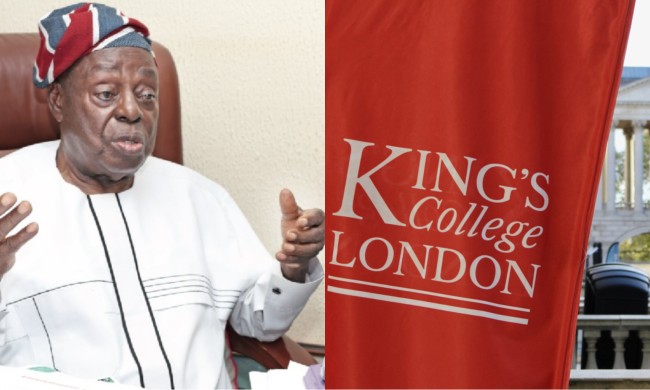
King’s College London (KCL), a prestigious institution in the United Kingdom, finds itself under intense scrutiny due to its affiliation with the Afe Babalola Centre for Transnational Education, named after renowned Nigerian lawyer Afe Babalola. Nigerians have raised concerns over alleged abuses of power by Babalola, prompting growing calls for the institution to reconsider its association with him.
The situation has intensified following Babalola’s legal actions against Nigerian human rights lawyer Dele Farotimi, whom he accused of defamation. Many Nigerians have condemned Babalola’s alleged use of police authorities to harass Farotimi, leading to his current detention. Reports indicate that KCL is closely monitoring these developments amid mounting public pressure to rename the centre.
Background of the Afe Babalola Centre
Established in 2023, the Afe Babalola Centre for Transnational Education was created to provide African youth with educational opportunities they might not otherwise access. Funded by Afe Babalola, the centre’s mission, as stated on its website, is to empower young Africans to make meaningful contributions to their communities and beyond.
However, critics argue that the allegations against Babalola cast a shadow over the centre’s mission. Sources revealed that KCL is considering public concerns and has sought advice from Amnesty International, a leading human rights organization, on the way forward.
Allegations Against Afe Babalola
Babalola’s defamation suit against Farotimi stems from claims made in Farotimi’s book, Nigeria and Its Criminal Justice System. The book alleges corruption involving Babalola and his law firm, accusations Babalola has vehemently denied. According to court documents, the charges against Farotimi include making false statements likely to incite public unrest and defame Babalola’s reputation.
The Ekiti State Magistrate Court in Ado-Ekiti has denied bail to Farotimi, citing the gravity of the charges. The case, marked as suit number MAD/1,476.C/2024, has been adjourned to December 10, 2024.
Amnesty International’s Response
Amnesty International has called for Farotimi’s immediate and unconditional release, highlighting concerns over fair treatment in Nigerian police custody. The organization emphasized that police interrogation centers in Nigeria are often sites of human rights violations and urged the Nigerian government, led by President Bola Tinubu, to halt the suppression of dissenting voices.
In a statement shared on social media, Amnesty International said: “Dele Farotimi must be immediately and unconditionally released. In custody of Nigeria Police, there is little hope of fair treatment and no transparency. Police interrogation centers are also notorious locations of possible violations. President Bola Tinubu’s government must end this escalating clampdown on dissenting voices and allow everyone in the country to freely exercise their human rights as guaranteed by Nigeria’s constitution and international law.”
Public Pressure Mounts
Sources close to the matter disclosed that KCL received a £10 million donation from Afe Babalola to establish the centre. While this funding underscores Babalola’s commitment to education, the controversy surrounding his actions has sparked debates about whether KCL should sever ties with him.
“There is significant panic at King’s College London over the scandal involving Afe Babalola and Farotimi. The institution is under immense public pressure from Nigerians worldwide to cancel the naming of the centre,” a source said. “The College has sought Amnesty International’s guidance on how to proceed.”
Court Proceedings and Allegations
Farotimi’s charges include claims that he defamed Babalola by accusing him of influencing judicial outcomes. Specific excerpts from Farotimi’s book allege that Babalola and his associates compromised the Supreme Court to secure fraudulent judgments, statements that Babalola asserts are baseless and damaging to his reputation.
The court’s refusal to grant bail has further fueled public outrage. Farotimi’s supporters argue that his arrest represents a broader crackdown on dissent in Nigeria, raising questions about judicial independence and freedom of expression.
As the case unfolds, KCL’s decision regarding the Afe Babalola Centre will be closely watched, not only in Nigeria but globally, as an indicator of how institutions navigate ethical dilemmas involving benefactors.
For more updates, join our WhatsApp channel: Chronicles Reporters.